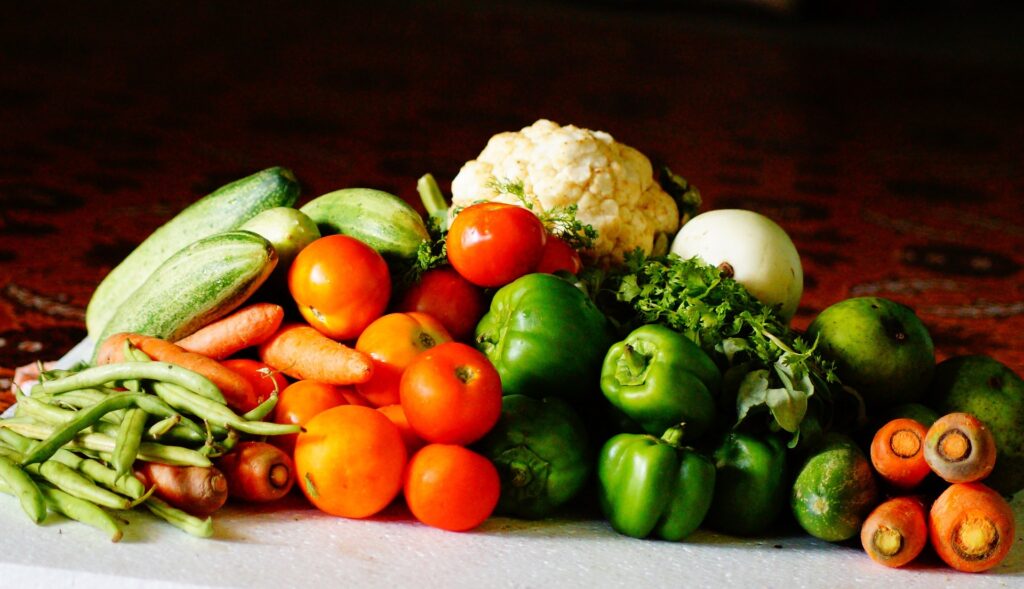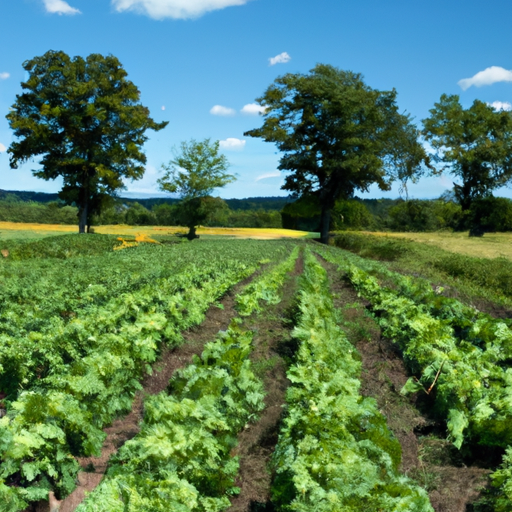In the world of agriculture, there is a growing recognition of the importance of sustainable farming practices. Among them, organic farming has emerged as a popular choice. But why is organic farming considered more sustainable? Well, it’s all about the methods employed and the impact they have on the environment.
By avoiding synthetic pesticides and fertilizers, organic farming promotes soil health, protects biodiversity, and reduces water pollution. Additionally, organic farming techniques focus on building natural systems, creating a balance between nature and agriculture. It’s no wonder that organic farming is celebrated for its ability to provide long-term benefits for both the environment and human health.

Check Out Our Top Eco Friendly Product Picks On Amazon Here
Reduced chemical inputs
Organic farming is renowned for its reduced use of chemical inputs, particularly synthetic pesticides. This practice eliminates the harmful effects of these chemicals on the environment, wildlife, and human health. By avoiding the use of synthetic pesticides, organic farmers rely on natural pest control methods to manage pests, such as crop rotation, companion planting, and biological pest control. This not only protects the crops but also promotes a healthier ecosystem by encouraging beneficial insects and organisms to thrive.
Moreover, organic farming also limits the use of synthetic fertilizers. Instead, farmers rely on natural sources of nutrients, such as compost, manure, and crop residues, to enhance soil fertility. This approach encourages the sustainable cycling of nutrients, reducing the risk of nutrient pollution in water bodies. By nurturing the soil biodiversity, organic farming promotes a healthy and thriving soil ecosystem that naturally regulates nutrient availability to plants, reducing the need for chemical input.
Preservation of soil health
Maintaining soil health is of utmost importance in organic farming. Organic farmers adopt practices that prioritize the preservation of soil structure, ensuring its long-term fertility and productivity. By avoiding the use of heavy machinery and excessive tilling, farmers minimize soil compaction and erosion, preserving the natural integrity of the soil.
Through techniques such as cover cropping, mulching, and crop rotation, organic farmers enhance soil fertility. These practices prevent nutrient depletion and encourage the buildup of organic matter, leading to increased soil microbial activity and improved nutrient availability for plants. The result is healthy and nutrient-rich soil that supports sustainable agriculture and protects water quality by reducing nutrient runoff.
Conservation of water resources
Organic farming places great emphasis on the conservation of water resources. By reducing water pollution, organic farmers prevent the contamination of water bodies with synthetic fertilizers and pesticides. This helps maintain the integrity of ecosystems and ensures the availability of clean water for both human consumption and wildlife habitats.
Efficient water management is a key principle of organic farming. Farmers implement techniques such as drip irrigation, rainwater harvesting, and soil moisture monitoring to optimize water usage. By minimizing irrigation needs, organic farming reduces the strain on water resources, especially in regions prone to droughts. This sustainable approach not only conserves water but also reduces energy consumption associated with pumping and irrigation.
Mitigation of climate change impact
Organic farming plays a vital role in mitigating the impact of climate change. By adopting sustainable practices, organic farmers strive to lower their carbon footprint. Avoiding the use of synthetic pesticides and fertilizers reduces greenhouse gas emissions associated with their production and application. Organic farming also promotes carbon sequestration through the increased use of organic matter and cover crops, which capture and store carbon in the soil.
Additionally, organic farming encourages the use of renewable energy sources and promotes energy-efficient farm management practices. By reducing reliance on fossil fuels, organic farmers contribute to the reduction of greenhouse gas emissions and promote a more sustainable and climate-friendly agricultural system.

Protection of Biodiversity
Organic farming is a champion for biodiversity conservation. By preserving wildlife habitats within and around farmlands, organic farmers provide refuge for various species of animals, birds, and insects. This conservation supports the balance of ecosystems, contributing to the overall health of the environment.
Furthermore, organic farming practices prioritize the support of pollinators, such as bees and butterflies, which are crucial for crop pollination. By avoiding the use of synthetic pesticides that harm these pollinators, organic farmers provide a safe and nourishing habitat for them to thrive.
Organic farming also promotes the maintenance of genetic diversity in crops. By cultivating a wider range of crop varieties and landraces, organic farmers help safeguard against the risk of widespread crop failures due to diseases, pests, or environmental changes. This diversity also contributes to the nutritional value and overall resilience of our food supply.
Lastly, organic farming helps prevent genetic contamination, particularly in relation to genetically modified organisms (GMOs). By adopting strict guidelines and regulations, organic farmers ensure that their crops remain free from GMOs, protecting the integrity of organic produce and the choice of consumers who prefer organic food options.
Enhancement of food safety and quality
Organic farming places great importance on food safety and quality. By reducing chemical residues in produce, organic farming minimizes the potential health risks associated with consuming synthetic pesticides and fertilizers. Organic standards prohibit the use of most synthetic chemicals, ensuring that organic food is produced using a holistic and sustainable approach.
Moreover, organic farming promotes nutrient-rich produce. By maintaining soil fertility through organic matter and natural soil amendments, organic farmers enable plants to absorb a wide range of essential minerals and nutrients. The result is nutritional quality comparable to conventionally grown food, if not superior in some cases.
Organically grown food is often celebrated for its superior taste and flavor. By nurturing the soil, organic farmers create optimal conditions for the development of rich and complex flavors in their produce. Many consumers attest that organic food simply tastes better, making it a desirable choice for those seeking a delightful culinary experience.
Lastly, organic farming helps reduce the risk of antibiotic resistance. By avoiding the routine use of antibiotics in livestock and poultry, organic farmers contribute to the preservation of effective antibiotic treatments for human and animal health. This responsible approach reduces the spread of antibiotic-resistant bacteria, ensuring the long-term efficacy of these crucial medical interventions.

Support for small-scale farmers
One of the significant advantages of organic farming is its inherent support for small-scale farmers. By reducing dependence on expensive inputs, such as synthetic pesticides and fertilizers, organic farming promotes economically viable farming practices that are accessible to smaller-scale operations.
Furthermore, organic farmers gain access to wider markets. Organic produce commands a premium price due to its perceived value in terms of sustainability, health benefits, and quality. This allows small-scale organic farmers to tap into markets that appreciate and are willing to pay for organic products, providing them with increased income opportunities and stability.
Organic farming also advocates for fair prices and income stability for farmers. By removing intermediaries and encouraging direct relationships between farmers and consumers, organic farming helps ensure that farmers receive a fair share of the economic value generated by their hard work and dedication. This empowerment strengthens the economic viability of small-scale farming, preserving rural livelihoods and fostering sustainable rural communities.
Reduction of energy consumption
Organic farming is committed to reducing energy consumption by implementing sustainable practices. By promoting lower reliance on fossil fuels, organic farmers contribute to the overall reduction of greenhouse gas emissions and environmental degradation associated with energy production and consumption.
Organic farming encourages the use of sustainable energy sources such as wind, solar, and bioenergy. By adopting renewable energy solutions, farmers can power their operations with cleaner and more sustainable alternatives. This not only reduces the carbon footprint but also minimizes the reliance on finite and polluting energy sources.
Additionally, organic farming emphasizes efficient farm management practices. By optimizing resource use, such as water, fertilizer, and energy, farmers can minimize waste and improve overall energy efficiency. These practices range from precision farming technologies to improved machinery and equipment designs, all contributing to a more sustainable and energy-conscious agricultural system.

Promotion of organic waste management
Organic farming promotes the effective management of organic waste. By encouraging composting and recycling, farmers can turn organic waste into valuable soil amendments and enrich their soil fertility naturally. This closed-loop approach minimizes waste sent to landfills while simultaneously improving soil health and reducing the need for synthetic fertilizers.
Furthermore, organic farming aims to minimize chemical waste. By adhering to organic standards and regulations, farmers avoid the use of synthetic chemicals that can accumulate in the environment and become hazardous waste. This responsible approach ensures the long-term sustainability of farming practices and protects ecosystems from potential harms.
Moreover, organic farming utilizes by-products from various industries to reduce waste. For example, agricultural residues, such as straw, corn stalks, or fruit peels, can be utilized in organic farming as beneficial materials. This innovative reuse of by-products contributes to the circular economy concept and further reduces waste generation.
Less risk of resistance development
Organic farming actively works to reduce the risk of resistance development, both in terms of antibiotics and pesticides. By decreasing the use of antibiotics in livestock and poultry production, organic farming helps preserve the efficacy of these vital medications for human and animal health. This prudent approach avoids the overuse and misuse of antibiotics, which can lead to the development of antibiotic-resistant bacteria, posing a significant threat to global health.
Additionally, organic farming follows strict guidelines regarding the use of pesticides. By limiting the use of synthetic pesticides, organic farmers minimize the likelihood of pests developing resistance to these chemicals. This sustainable approach encourages the adoption of integrated pest management strategies, prioritizing natural pest control methods, and reducing reliance on chemical interventions.
In conclusion, organic farming is widely considered more sustainable due to its reduced chemical inputs, preservation of soil health, conservation of water resources, mitigation of climate change impact, protection of biodiversity, enhancement of food safety and quality, support for small-scale farmers, reduction of energy consumption, promotion of organic waste management, and the lessened risk of resistance development. By adhering to these principles, organic farming presents itself as a viable and environmentally friendly alternative to conventional agriculture, contributing to a more sustainable and resilient food system.
Check Out Our Top Eco Friendly Product Picks On Amazon Here




